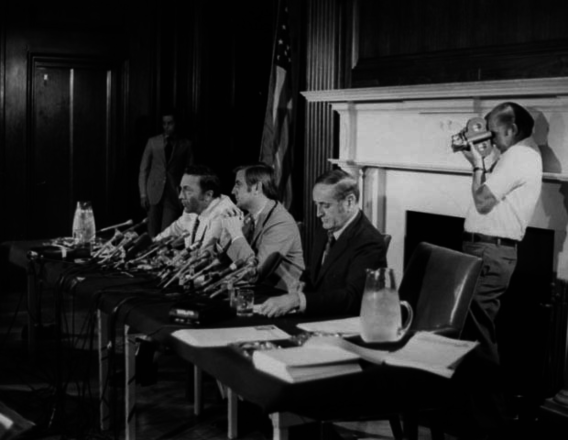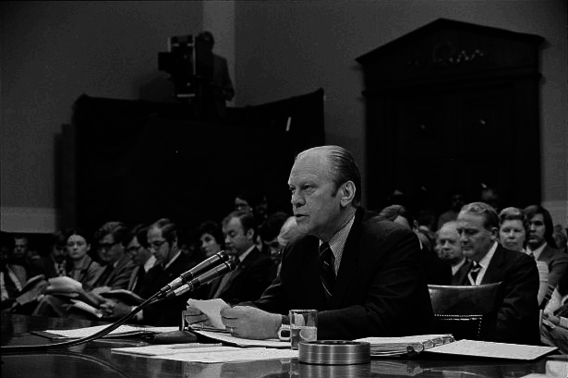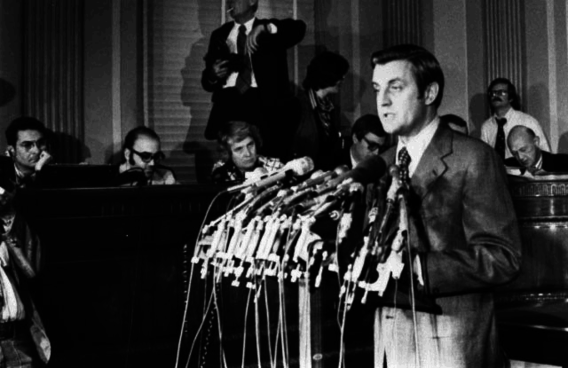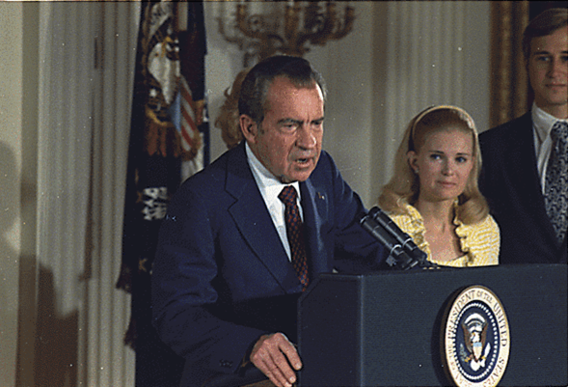Excerpt 1

"Public financing of presidential campaigns is the most fundamental and potentially far-reaching election reform adopted in this century. If it works—as I am confident it can work—it will effectively divorce presidential politics from the corrosive influence of big money and special interests.
So long as we have a system of campaign financing which not only relies on but encourages large contributions from the wealthy, so long will we have a government in which moneyed interests speak louder than people interests.
That is what the dollar checkoff is designed to correct and that is why its effectiveness is so crucial to the integrity of our political system." 93rd Cong., 1st sess., Congressional Record 119 (March 6, 1973) at 6500.
Excerpt 2
"I want a strong President. We must have one. But I want a President who is legal, whose operations are public, and who is accountable to the American people." 93rd Cong., 1st sess., Congressional Record 119 (September 5, 1973) at 28552.
Excerpt 3
"What is at stake here goes to the very heart of our democracy. The terrible abuses Watergate has brought to light show what can happen when government is put up for sale to the highest bidder. It is no longer government of, for, and by the people; it is government of, for, and by those who are willing and able to pay the going rate. It is more than we care to admit, a 'buy America' system that we have today.
If you pay your assessment, you may get an antitrust suit killed, an airline route awarded, a tax loophole continued, a minimum wage bill vetoed, or whatever else you might need. But the average person who works every day, pays his taxes, and maybe gives 10 bucks to a candidate, cannot find anyone in Government who cares about him or about his problems.
No wonder he feels cut off from Government. No wonder he does not trust politicians. No wonder he thinks we are all crooks." 93rd Cong., 1st sess., Congressional Record 119 (November 27, 1973) at 38183.
Excerpt 4
"There is only one way to hold a sitting President accountable. And a President must be accountable. It rests with the House of Representatives to hold the President accountable. When we denigrate impeachment, we denigrate a device which the framers regarded as essential to a republican form of government. When we ignore impeachment, we ignore an important element in our system of checks and balances. When we allow impeachment to be frustrated by Presidential fiat, we frustrate the Constitution." 93rd Cong., 2nd sess., Congressional Record 120 (June 3, 1974) at 17317.
Excerpt 5

"President Ford's action on Sunday—pardoning former President Nixon—may have been an act of mercy toward Mr. Nixon. But I would like to suggest that it was an unfair, unfortunate, and unethical act toward the American people and toward our system of justice....
Not only... is Mr. Ford's act the ultimate coverup. It is also the ultimate injustice.
As I drive to the Capitol Building each morning, I see four words written over the portals of the Supreme Court Building across from the Capitol. Those words are 'Equal Justice Under Law.'" 93rd Cong., 2nd sess., Congressional Record 120 (September 11, 1974) at 30747.
Excerpt 6

"There is no question but that a candidate must necessarily spend more time pursuing dollars for his campaign than he does pursuing policies for his Presidency. It's not that a candidate willingly chooses that set of priorities, but the system forces him to do so. I believe most candidates share my intense dislike for that fact, but they have no other choice if they hope to be successful. As we will see, public financing of elections has improved this situation somewhat, but not to the extent that many believe."
Walter Mondale, The Accountability of Power: Toward a Responsible Presidency (New York: David McKay Company, Inc., 1975), 38.
Excerpt 7
"Presidential judgments must be tested by the normal standards of reason and by their acceptability to a fully informed public. They should carry no mystery."
Walter Mondale, The Accountability of Power: Toward a Responsible Presidency (New York: David McKay Company, Inc., 1975), 124.
Excerpt 8

credit: Richard Nixon Library
"This is the meaning of an open and accountable Presidency. Openness does not require a President to show the scars on his abdomen but to candidly tell the people the truth about his policies. Accountability is measured less by whether a President cooks his own breakfast than by whether he consults widely before making crucial decisions. The surface actions are important, because they can indicate Presidential personalities less likely to become isolated by the trappings of the Presidential establishment. But ways of thinking and perceptions of reality are more important, for they influence the types of decisions Presidents make and the kinds of policies they pursue."
Walter Mondale, The Accountability of Power: Toward a Responsible Presidency (New York: David McKay Company, Inc., 1975), 270.
Excerpt 9
"Since the Carter administration left office, we have been criticized for many things. Yet I remain enormously proud of what we did in those four years, especially that we told the truth, obeyed the law and kept the peace."
Walter Mondale, "Answering to No One," The Washington Post, sec. 2, July 29, 2007.